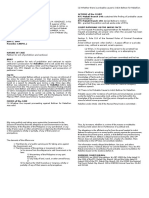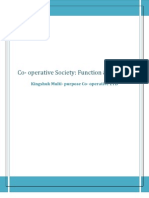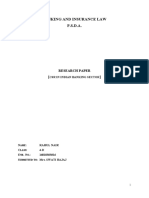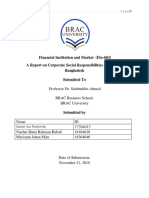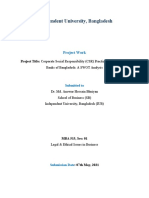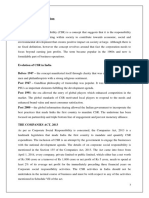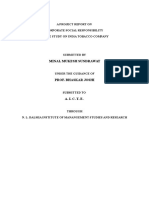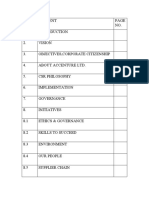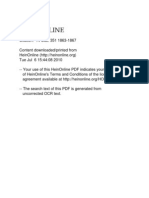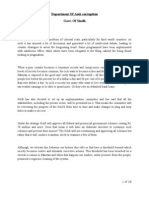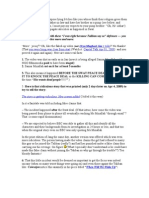0 ratings0% found this document useful (0 votes)
82 viewsAssignment On CSR by Zahid
Assignment On CSR by Zahid
Uploaded by
Raihan islamRobi Axiata Bangladesh outlines its CSR procedure in 3 key parts:
1. Internal structure consisting of board, management, and lower level committees to oversee CSR projects.
2. Project identification in areas like education, healthcare, livelihoods, and infrastructure.
3. Execution and monitoring of projects directly by Robi or through government and NGO partners, with quarterly reporting to management and board committees.
Copyright:
© All Rights Reserved
Available Formats
Download as PDF, TXT or read online from Scribd
Assignment On CSR by Zahid
Assignment On CSR by Zahid
Uploaded by
Raihan islam0 ratings0% found this document useful (0 votes)
82 views7 pagesRobi Axiata Bangladesh outlines its CSR procedure in 3 key parts:
1. Internal structure consisting of board, management, and lower level committees to oversee CSR projects.
2. Project identification in areas like education, healthcare, livelihoods, and infrastructure.
3. Execution and monitoring of projects directly by Robi or through government and NGO partners, with quarterly reporting to management and board committees.
Original Title
Assignment on CSR By Zahid
Copyright
© © All Rights Reserved
Available Formats
PDF, TXT or read online from Scribd
Share this document
Did you find this document useful?
Is this content inappropriate?
Robi Axiata Bangladesh outlines its CSR procedure in 3 key parts:
1. Internal structure consisting of board, management, and lower level committees to oversee CSR projects.
2. Project identification in areas like education, healthcare, livelihoods, and infrastructure.
3. Execution and monitoring of projects directly by Robi or through government and NGO partners, with quarterly reporting to management and board committees.
Copyright:
© All Rights Reserved
Available Formats
Download as PDF, TXT or read online from Scribd
Download as pdf or txt
0 ratings0% found this document useful (0 votes)
82 views7 pagesAssignment On CSR by Zahid
Assignment On CSR by Zahid
Uploaded by
Raihan islamRobi Axiata Bangladesh outlines its CSR procedure in 3 key parts:
1. Internal structure consisting of board, management, and lower level committees to oversee CSR projects.
2. Project identification in areas like education, healthcare, livelihoods, and infrastructure.
3. Execution and monitoring of projects directly by Robi or through government and NGO partners, with quarterly reporting to management and board committees.
Copyright:
© All Rights Reserved
Available Formats
Download as PDF, TXT or read online from Scribd
Download as pdf or txt
You are on page 1of 7
Assignment on
Corporate social responsibility practice in Bangladesh
Submitted to
Sonia Sharmin
Lecturer of premier university
Submitted by
Zahid Hasan
ID: 3576
Submission Date: 07/09/2020
TOPICS
1.Describe CSR practice in Bangladesh
2.Choose any firm in BD that practice
CSR then describe the procedure of it.
1.1 CSR practice in Bangladesh:
There is in Bangladesh a long history of philanthropic activities from time
immemorial. These philanthropic activities included donations to different
charitable organizations, poor people and religious institutions ( Miyan 2006).
The CSR World Wide portal conclude that, in Bangladesh Civil society,
businesspeople and politicians view CSR in terms of philanthropy, particularly
in the schools and the healthcare sector. This focus is also rooted in the
country's Islamic tradition of calling upon those with more resources to help the
disadvantaged. Accordingly, companies are expected, most of all, to engage in
charitable works, for example by providing donations or incompany training
programs (The CSR World Wide portal, 2012). Till now, most of the businesses
in Bangladesh are family owned and first generation businesses. They are
involved in community development work in the form of charity without having
any definite policy regarding the expenses or any concrete motive regarding
financial gains in many instances. Moreover, most of the SMEs fall under the
informal sector having low management structure and resources to address the
social and environmental issues. The discussions on CSR practices in
Bangladesh in its modern global terms, is relatively new. In general, it is true
that in Bangladesh, the status of labor rights practices, environmental
management and transparency in corporate governance is not satisfactory,
largely due to poor enforcement of existing laws and inadequate pressure from
civil society and interest groups like Consumer Forums. Globally, as CSR
practices are gradually being integrated into international business practices and
hence is becoming one of the determining factors for market accesses, it is
becoming equally instrumental for local acceptability. A focus on CSR in
Bangladesh would be useful, not only for improving corporate governance,
labor rights, work place safety, fair treatment of workers, community
development and environment management, but also for industrialization and
ensuring global market access. By now, many CSR dimensions are practiced in
Bangladesh (Miyan 2006, Mondol,2009) Though CSR is a relatively new
concept in Bangladeshi corporate culture, awareness of corporate social
reporting has rapidly increased. All companies need to consider their CSR for
two basic reasons. Firstly, there is intensifying pressure from stakeholders to do
so (Belal, 2001 cited Azim 2011). Any company that does not develop and
promote its CSR policy to all stakeholders will face increasing threats to its
reputation. Secondly, because it makes sound business sense, CSR enhances the
reputation of an organization, brings in new business and improves stakeholder
return (Kabir,2003 cited Azim 2011 ). The government of Bangladesh has not
imposed or proposed requirements for disclosure of social and environmental
performance. The Bangladesh Companies Act 1994 sets the general framework
for corporate financial reporting. However, no provisions regarding CSR exist
in the Companies Act 1994 (GoB, 1994). Until recently, there has not been a
separate Bangladesh Accounting Standard (BAS) regarding social and
environmental reporting (IASCF, 2003). In Bangladesh, CSR is still voluntary
with the exception of disclosure of expenditures on energy usage required under
the Companies Act of 1994 and the Securities and Exchange Rules of 1987,
which require the total amount spent on energy to be shown as a separate
expenditure in the notes to the financial statements (Belal, 2001). Since
corporate social reporting disclosure is voluntary in Bangladesh.
2. Corporate Social Responsibility Practices in Robi Axiata
Bangladesh:
Robi Axiata (Bangladesh) Constrained is a dynamic and best countrywide GSM
correspondence arrangement supplier. It is a joint endeavor organization
between Axiata Gathering Berhad, Malaysia, and NTT DOCOMO INC, Japan.
Axiata (Bangladesh) Restricted, previously known as Telekom Malaysia
Worldwide (Bangladesh), started its task in 1997 under the brand name Aktel
among the pioneer GSM portable broadcast communications specialist co-ops
in Bangladesh. A while later on 28th Walk, 2010 the organization began its new
adventure with the brand name Robi. The report deals with the Corporate Social
Responsibilities CSRs) of Robi Axiata Ltd. The report includes a brief
discussion of CSR activities and exemplifies in detailed by the CSRs of
Robi.CSR is a familiar terminology in recent times, and its practices are being
integrated into the national and international arena. So far I have found that
Robi draws in itself in various kinds of Corporate Duty (CR) programs.
Through its CR activities, Robi expects towards the advancement of the
financial and environmental state of the nation through improving individuals'
lives concentrating on their essential needs just as monitoring the elite culture
and Legacy of Bangladesh. I tried to understand how they are conducting the
activities, the nature, and sector of their work and how they are communicating
their activities to increase the awareness level. Robi is firstly promoting its
brand besides endorsing it is enabling positive force on the civilization, mainly,
through its 'center operations' or business footstep and secondly, during its
aptitude to put out to national development goals by empowering People.
CSR Procedure in Robi Axiata Bangladesh
INTERNAL STRUCTURE:
1. Board level committee – The Committee will consist of 3 members. It will be
headed by the Chairman-cum-Managing Director and also have an Independent
Director.
2. Management level Committee – The Chairman-cum-Managing Director will
appoint a Committee consisting of at least 3 members, two of which will be
General Managers.
3. Management lower level Committee – The Chairman-cum-Managing
Director will appoint a Committee consisting of at least 3 members. It will be
headed by General Manager of CSR Department and shall also have two
Deputy General Managers.
Management level Committees Functions:
The General Manager heading the Committee will be assigned a team of
officials to assist him/her.
The Committee will:
1. Identify the projects for CSR activities,
2. Estimate the amount of expenditure needed on each of the activities,
3. Oversee the implementation of CSR and Sustainability agenda of the
company within the organization and also outside, i.e. covering internal as well
as external stakeholders,
4. Submit reports regarding the progress in the implementation of CSR and
Sustainability activities to the Board level Committee on quarterly basis,
5. Monitor the Corporate Social Responsibility Policy of the company and
review it annually, and
6. Implement projects which fall within its delegated authority.
Board level Committee Functions:
1. The Board level Committee will oversee the entire process of implementation
of CSR elated activities through review meeting on the reports of Management
level Committee, which will be submitted to it Quarterly, and
2. The Committee will review the CSR Policy annually.
PROJECT IDENTIFICATION:
1. Eradication of extreme hunger, malnutrition and poverty.
2. Promoting health care.
3. Making available safe drinking water.
4. Promotion of mid-day meal scheme.
5. Promotion of education, including special education.
6. Promoting gender equality and empowering women.
7. Livelihood enhancement pro.
8. Robi 10 mintue School
9. Robi internet corner incubating knowledge based society across the country.
EXECUTION:
1. For promoting risk management, educating the various sections of the society
would be the best option available to further the cause.
2. Our endeavour would also be to promote learning and knowledge at every
stage with special stress on management of risk through system of educational
Institutions.
3. In Health care, our goal would be to render quality health care facilities to
people, especially those living in the villages through health Insurance
mechanism.
4. In Sustainable Livelihood, our programs will aim at providing livelihood in a
locally appropriate and environmentally sustainable manner through NGO’s.
5. In Infrastructure Development, we endeavour to set up essential services that
will form the foundation of sustainable development through NGO or
Government machineries active in the area chosen.
MONITORING, REVIEW & REPORTING:
1. Each activity will be reviewed quarterly by the Management level Committee
to see that the financial inputs provided to either the executing agency or the
Corporations department for a specific purpose is utilized in the best possible
manner.
2. The quarterly report will be submitted by the Management level Committee
to the Board level Committee.
3. The Board level Committee will submit quarterly reports to the Board
IMPLEMENTING AGENCIES:
1. Directly by the Corporation
2. Government Projects
3. NGOs
You might also like
- CSR of Exim Bank of BanhladeshDocument10 pagesCSR of Exim Bank of BanhladeshZahid HasanNo ratings yet
- Social Relevance Black BookDocument47 pagesSocial Relevance Black BookpavanNo ratings yet
- Demonstrating Responsible Business: CSR and Sustainability Practices of Leading Companies in IndiaFrom EverandDemonstrating Responsible Business: CSR and Sustainability Practices of Leading Companies in IndiaNo ratings yet
- Beltran vs. PeopleDocument2 pagesBeltran vs. PeopleMichelle Montenegro - Araujo100% (2)
- Law On Environment and Natural ResourcesDocument7 pagesLaw On Environment and Natural ResourcesDennis VelasquezNo ratings yet
- Personal Reflective Essay: TCW Activity 2Document2 pagesPersonal Reflective Essay: TCW Activity 2charlene sebronNo ratings yet
- Assignment On CSR by Raihan PDFDocument6 pagesAssignment On CSR by Raihan PDFRaihan islamNo ratings yet
- CSR Activities of BangladeshDocument8 pagesCSR Activities of BangladeshTowsif Noor JameeNo ratings yet
- Corporate Social ResponsibilityDocument6 pagesCorporate Social ResponsibilityTiny HumanNo ratings yet
- CSR in Islamic Bank BDDocument19 pagesCSR in Islamic Bank BDMd Shohag Ali0% (2)
- Ethics Assignment 2 (Mahfuz 68M) PDFDocument10 pagesEthics Assignment 2 (Mahfuz 68M) PDFMd.sabbir Hossen875No ratings yet
- Assignment:: Corporate Social Responsibility: CSR at Unilever Bangladesh LimitedDocument16 pagesAssignment:: Corporate Social Responsibility: CSR at Unilever Bangladesh LimitedMaruf AhashanNo ratings yet
- Busi Ethics AssgnDocument8 pagesBusi Ethics AssgnPanjerNo ratings yet
- CSR PDFDocument56 pagesCSR PDFSafayetChowdhuryNo ratings yet
- Canara Bank CSR - IMPPPDocument15 pagesCanara Bank CSR - IMPPProhitNo ratings yet
- Corporate Social Responsibilities of Dhaka Bank LTDDocument8 pagesCorporate Social Responsibilities of Dhaka Bank LTDShahidul Islam Rasel100% (2)
- BIT, Dept. of CS&E 2022-23 1Document34 pagesBIT, Dept. of CS&E 2022-23 1amogh jNo ratings yet
- Co - Operative SocietyDocument40 pagesCo - Operative SocietyZubairia Khan100% (5)
- CSR CourseworkDocument6 pagesCSR Courseworkuifujzhfg100% (2)
- CSR ReportingDocument21 pagesCSR ReportingrahmanmafrNo ratings yet
- CSR Prac in BD by RashadDocument4 pagesCSR Prac in BD by Rashadgmr ekduiNo ratings yet
- 17MGT058 (MD Saim)Document7 pages17MGT058 (MD Saim)Golam MostofaNo ratings yet
- .BD BASISDocument7 pages.BD BASISNayeema AkterNo ratings yet
- Corporate Social ResponsibilityDocument5 pagesCorporate Social ResponsibilityAkhil AggarwalNo ratings yet
- Corporate Social Responsibility Practice in Private Commercial Bank A Case Study On Islami Bank Bangladesh LimitedDocument40 pagesCorporate Social Responsibility Practice in Private Commercial Bank A Case Study On Islami Bank Bangladesh Limitedaziztarek1812No ratings yet
- Banking and Insurance LawDocument14 pagesBanking and Insurance LawRahul NairNo ratings yet
- MBD 205Document7 pagesMBD 205Kunal DasNo ratings yet
- Corporate Social ResponsibilityDocument7 pagesCorporate Social ResponsibilitySri KanthNo ratings yet
- Corporate Social Responsibility at Bharat Petroleum: A Project Report OnDocument24 pagesCorporate Social Responsibility at Bharat Petroleum: A Project Report OnSharan NijjarNo ratings yet
- Canara Bank CSR Initiatives - Commitment To Social ResponsibilityDocument15 pagesCanara Bank CSR Initiatives - Commitment To Social ResponsibilityNirvana CélesteNo ratings yet
- Independent University Bangladesh School of Business MBA Program Summer 2020Document8 pagesIndependent University Bangladesh School of Business MBA Program Summer 2020Showkatul IslamNo ratings yet
- Arihant Corp ProjectDocument13 pagesArihant Corp ProjectRahul RajNo ratings yet
- New Microsoft Office WordDocumentDocument3 pagesNew Microsoft Office WordDocumentPranav PanchalNo ratings yet
- FORE School of Management: Project ReportDocument15 pagesFORE School of Management: Project ReportJagrit BiswasNo ratings yet
- CSR Assignment: Q1. Analyse The Trends in HDFC Spending On CSRDocument3 pagesCSR Assignment: Q1. Analyse The Trends in HDFC Spending On CSRPrateek SinghNo ratings yet
- FIN 603 Corporate Social Responsibilities of Banks Term Paper ResubmissionDocument33 pagesFIN 603 Corporate Social Responsibilities of Banks Term Paper ResubmissionNuzhat Binta RahmanNo ratings yet
- Premier University, Chittagong: Faculty of Business AdministrationDocument15 pagesPremier University, Chittagong: Faculty of Business AdministrationAshim DasNo ratings yet
- Independent University, Bangladesh: Project WorkDocument8 pagesIndependent University, Bangladesh: Project WorkfatemaNo ratings yet
- Comparative LawDocument15 pagesComparative LawHarshit MalviyaNo ratings yet
- Ijsrp p2486Document8 pagesIjsrp p2486Arshad MohammedNo ratings yet
- SM - CSRDocument29 pagesSM - CSRKakali ChatterjeeNo ratings yet
- Corporate Social Responsibility Implementation in India: Opportunities and ChallengesDocument9 pagesCorporate Social Responsibility Implementation in India: Opportunities and ChallengesKanha muduliNo ratings yet
- Corporate Social ResponsibilityDocument5 pagesCorporate Social ResponsibilityShobhit AwasthiNo ratings yet
- Evolution in IndiaDocument8 pagesEvolution in Indiashipra maheshwariNo ratings yet
- Corporate Social Responsibility (CSR) of MNC's in Bangladesh.Document42 pagesCorporate Social Responsibility (CSR) of MNC's in Bangladesh.Ami MugdhoNo ratings yet
- Corporate Social Responsibility of First Security Islami BankDocument36 pagesCorporate Social Responsibility of First Security Islami BankRadwan RahmanNo ratings yet
- BL 1Document12 pagesBL 1sruthi karthiNo ratings yet
- Maslahah (The Public Good) Serve As Foundations For Such A Perspective. The ImplicationsDocument25 pagesMaslahah (The Public Good) Serve As Foundations For Such A Perspective. The Implicationsmd.jewel ranaNo ratings yet
- Ilide - Info Tata Group CSR PR - RemovedDocument25 pagesIlide - Info Tata Group CSR PR - Removedsubhajitmitra999No ratings yet
- Itc CSRDocument58 pagesItc CSRminal100% (1)
- Bess Session ReportDocument2 pagesBess Session ReportAnuranjan ThakurNo ratings yet
- CSR EssayDocument5 pagesCSR EssaySamrat ChowdhuryNo ratings yet
- Sonali Bank Limited (SBL)Document19 pagesSonali Bank Limited (SBL)Aminul Rana50% (2)
- Thesis On Corporate Social Responsibility in IndiaDocument6 pagesThesis On Corporate Social Responsibility in IndiaPaperWritingServiceCheapUK100% (2)
- Chapter - One: "Corporate Social Responsibility Practices in Commercial Banking Sector in Bangladesh"Document37 pagesChapter - One: "Corporate Social Responsibility Practices in Commercial Banking Sector in Bangladesh"Abhijit Acharya AbhiNo ratings yet
- Assignment CSRDocument18 pagesAssignment CSRKimsNo ratings yet
- CSR ProjectDocument8 pagesCSR ProjectSibil SamsonNo ratings yet
- CSR Doc AARUSHIDocument16 pagesCSR Doc AARUSHIaarushiNo ratings yet
- Chapter - 6: 6.1 ConclusionDocument21 pagesChapter - 6: 6.1 ConclusionTalfa ShamsiNo ratings yet
- Incubating Indonesia’s Young Entrepreneurs:: Recommendations for Improving Development ProgramsFrom EverandIncubating Indonesia’s Young Entrepreneurs:: Recommendations for Improving Development ProgramsNo ratings yet
- Highlights of ADB’s Cooperation with Civil Society Organizations 2020From EverandHighlights of ADB’s Cooperation with Civil Society Organizations 2020No ratings yet
- 1865 1867 Statutes at Large 351-550Document201 pages1865 1867 Statutes at Large 351-550ncwazzyNo ratings yet
- M-S. Sasa Musa Sugar Works (P) LTD Vs Shobrati Khan and Others On 29 April, 1959Document7 pagesM-S. Sasa Musa Sugar Works (P) LTD Vs Shobrati Khan and Others On 29 April, 1959Knowledge GuruNo ratings yet
- July 2012Document26 pagesJuly 2012ig185011No ratings yet
- A Brief History of The White Nationalist MovementDocument73 pagesA Brief History of The White Nationalist MovementHugenNo ratings yet
- White Collar CrimeDocument27 pagesWhite Collar CrimeazharlibraNo ratings yet
- Philippine Amusement and Gaming Corporation (PAGCOR) vs. Bureau of Internal RevenueDocument19 pagesPhilippine Amusement and Gaming Corporation (PAGCOR) vs. Bureau of Internal Revenuevince005No ratings yet
- Samar Minallah and The Story of Flogging Girl in SwatDocument25 pagesSamar Minallah and The Story of Flogging Girl in Swatsadiakashi100% (1)
- Rubi Vs Provincial Board of MindoroDocument6 pagesRubi Vs Provincial Board of Mindorokarl doceoNo ratings yet
- Daoang vs. Municipal Judge of San Nicolas, Ilocos NorteDocument5 pagesDaoang vs. Municipal Judge of San Nicolas, Ilocos Nortekrissa_omandamNo ratings yet
- Prelim Examination in Introduction To Criminology: College of Criminal Justice EducationDocument2 pagesPrelim Examination in Introduction To Criminology: College of Criminal Justice EducationLorlie Bernales Blanca-Tanjay100% (2)
- ASEAN212 Module 5Document7 pagesASEAN212 Module 5janine jalecoNo ratings yet
- Domingo-Regala vs. SultanDocument5 pagesDomingo-Regala vs. SultanMheryza De Castro Pabustan100% (1)
- High Power Committee Report On Revamping of Civil DefenceDocument115 pagesHigh Power Committee Report On Revamping of Civil DefencedgcivildefencebiharNo ratings yet
- Republic Vs EvangelistaDocument2 pagesRepublic Vs EvangelistaVanya Klarika Nuque100% (8)
- Updated CompediumDocument3 pagesUpdated CompediumAnonymous 8UfwMNRTdNo ratings yet
- Rulemaking Regulations StructureDocument1 pageRulemaking Regulations StructureReynir EinarssonNo ratings yet
- Ihl and KashmirDocument23 pagesIhl and Kashmirdarakhshan100% (1)
- National Land Code 1965++Document17 pagesNational Land Code 1965++Dang Tzer ShiuanNo ratings yet
- Petitioners.: Regional Trial Court, Branch 9Document3 pagesPetitioners.: Regional Trial Court, Branch 9glaiNo ratings yet
- Bail Application Format Under Section 437 CRPCDocument2 pagesBail Application Format Under Section 437 CRPCShivani Prajapati88% (8)
- Neo MalDocument8 pagesNeo MalLatoya Toya EbanksNo ratings yet
- India: Outstanding Achievements and Dismal Failures: Muchkund DubeyDocument12 pagesIndia: Outstanding Achievements and Dismal Failures: Muchkund DubeykavyadeepamNo ratings yet
- BPSSC Online PDFDocument1 pageBPSSC Online PDFAbhishek YadavNo ratings yet
- G.R. Nos. 168992-93. May 21, 2009.Document11 pagesG.R. Nos. 168992-93. May 21, 2009.JnhNo ratings yet
- Colonialism in Africa-Short EssayDocument4 pagesColonialism in Africa-Short Essayapi-361981415No ratings yet
- Respuestas Test 1Document2 pagesRespuestas Test 1Marta Sampedro GonzalezNo ratings yet
- Case AnalysisDocument2 pagesCase AnalysisSanket DasNo ratings yet



